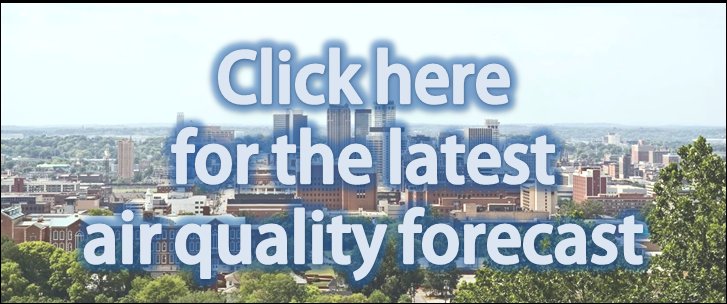
Air quality forecasts are issued every day of the year for the Birmingham area. The Jefferson County Department of Health forecasts fine particles (PM2.5) year-round and the Alabama Department of Environmental Management forecasts Ozone (O3) during the warm season. PM2.5 is a mixture of microscopic solids and liquid droplets suspended in air and exposure to such particles can affect both your lungs and your heart. O3 is created by chemical reactions between oxides of nitrogen (NOx) and volatile organic compounds (VOC) in the presence of sunlight and affects your lungs.

Air quality forecasts are based on the Air Quality Index (AQI). The AQI shows how clean or polluted the air is and the associated health effects. The AQI chart located below contains the levels of health concern, the values associated with each level, and actions to take for each level. For more information, please visit EPA's AIRNow.
| AQI Levels Health Concern |
AQI Value |
Actions to Take |
| Good | 0-50 | None |
| Moderate | 51-100 | Unusually sensitive people should consider limiting prolonged outdoor exertion |
| Unhealthy for Sensitive Groups |
101-150 | The following groups should limit prolonged outdoor exertion:
|
| Unhealthy | 151-200 | The following groups should limit prolonged outdoor exertion:
|
| Very Unhealthy | 200-300 | The following groups should limit prolonged outdoor exertion:
|
| An "Air Quality Alert" is issued on days when the AQI value is forecasted to be above 100. On "Air Quality Alert" days, the public is encouraged to do the following:
|